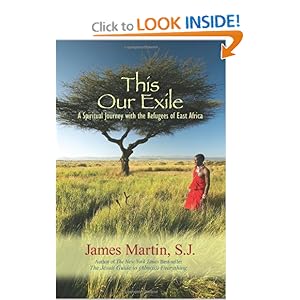This Our Exile: A Spiritual Journey With the Refugees of East Africa by James Martin SJ is a great book on the refugee crisis in Africa. It was published in ’99, but is definitely still a relevant read. I checked the book out of the library and read the book a couple of years back on my plane ride to China (crossing my fingers and gambling that I wouldn’t lose the book on my trip!). This was my first introduction to James Martin who has turned out to be my very favorite Jesuit. (He also happens to be the “Official Chaplain” of the Colbert Report if any of you are thinking his name seems familiar.)
The book is a first person account of Father Jim’s time in Kenya helping refugees and the story of how it changed him. Before he became a Jesuit he worked for GE and was on the corporate fast track. He quickly found the corporate world unfulfilling and became a Jesuit instead. In Kenya he puts his business training to use helping refugees, mainly women, set up microenterprises.
In This Our Exile James Martin is part tour guide, part comedian, part historian, part theologian, and, maybe most importantly, part narrator of the stories of the people he meets.
The book is eye opening, easy to read and a great introduction to refugees and those who work with them all over the world. It’s so good in fact, I think I am going to have another read through it!
An excerpt from his introduction:
“The refugees in East Africa, people whom I had only read about in newspapers, people whose lives I (literally) couldn’t begin to imagine, transformed my heart in ways that I also couldn’t have imagined. Their lives, a full measure of sorrows and joys, forced me to confront the basic human questions of what it means to suffer pain and to experience happiness. Seeing how the lives of the refugees continually moved between the twin poles of despair and hope showed me what enables people to continue, despite incredible difficulties, and still believe in a good God. Or, as one redoubtable Rwandese woman (whom you will soon meet) would tell me, “God is very good!” Their magnificent openness to life helped me face my own difficulties more honestly, and to stay in Kenya despite some strong temptations to leave. Most especially, in coming to know the refugees, and in being invited into their lives, I came to know more fully what it means to love and be loved.”

